Related Research Articles

The Allman Brothers Band was an American rock band formed in Jacksonville, Florida, in 1969 by brothers Duane Allman and Gregg Allman, as well as Dickey Betts, Berry Oakley (bass), Butch Trucks (drums), and Jai Johanny "Jaimoe" Johanson (drums). Subsequently, based in Macon, Georgia, they incorporated elements of blues, jazz and country music and their live shows featured jam band-style improvisation and instrumentals.

Gregory LeNoir Allman was an American musician, singer and songwriter. He was known for performing in the Allman Brothers Band. Allman grew up with an interest in rhythm and blues music, and the Allman Brothers Band fused it with rock music, jazz, and country at times. He wrote several of the band's most popular songs, including "Whipping Post", "Melissa", and "Midnight Rider". Allman also had a successful solo career, releasing seven studio albums. He was born and spent much of his childhood in Nashville, Tennessee, before relocating to Daytona Beach, Florida and then Macon, Georgia.
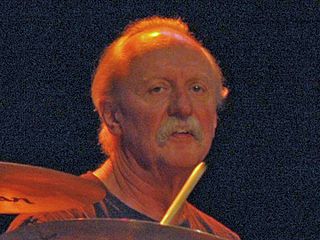
Claude Hudson "Butch" Trucks was an American drummer. He was best known as a founding member of The Allman Brothers Band, for which he was inducted into the Rock and Roll Hall of Fame in 1995. Trucks was born and raised in Jacksonville, Florida.

Forrest Richard Betts was an American guitarist, singer, songwriter, composer and founding member of The Allman Brothers Band.
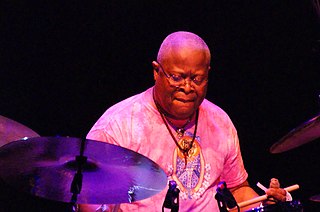
John Lee Johnson, frequently known by the stage names Jai Johanny Johanson and Jaimoe, is an American drummer and percussionist. He is best known as one of the founding members of the Allman Brothers Band and, with the death of Dickey Betts, is the last surviving original member of the band.

Brothers and Sisters is the fourth studio album by American rock band The Allman Brothers Band. Co-produced by Johnny Sandlin and the band, the album was released in August 1973 in the United States by Capricorn Records. Following the death of group leader Duane Allman in 1971, the Allman Brothers Band released Eat a Peach (1972), a hybrid studio/live album that became their biggest-selling album to date. Afterwards, the group purchased a farm in Juliette, Georgia, to become a "group hangout". However, bassist Berry Oakley was visibly suffering from the death of Duane, excessively drinking and consuming drugs. In November 1972, after nearly a year of severe depression, Oakley was killed in a motorcycle accident, making it the last album on which he played.

Win, Lose or Draw is the fifth studio album and sixth overall by American rock group the Allman Brothers Band. Produced by Johnny Sandlin and the band themselves, it was released on August 22, 1975 in the United States by Capricorn Records. It was the last studio album to feature bassist Lamar Williams and pianist Chuck Leavell.

Wipe the Windows, Check the Oil, Dollar Gas is a 1976 double live album by the Allman Brothers Band.

Charles Alfred Leavell is an American musician. A member of the Allman Brothers Band throughout their commercial zenith in the 1970s, he subsequently became a founding member of the band Sea Level. He has served as the principal touring keyboardist and musical director of the Rolling Stones since 1982. As a session musician, Leavell has performed on every Rolling Stones studio album released since 1983 with the exception of Bridges to Babylon (1997). He has also toured and recorded with Eric Clapton, George Harrison, David Gilmour, Gov't Mule and John Mayer.

"Jessica" is an instrumental piece by American rock band the Allman Brothers Band, released in December 1973 as the second single from the group's fourth studio album, Brothers and Sisters (1973). Written by guitarist Dickey Betts, the song is a tribute to gypsy jazz guitarist Django Reinhardt, in that it was designed to be played using only two fingers on the left hand.
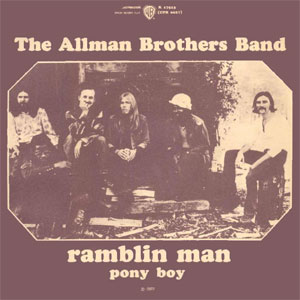
"Ramblin' Man" is a song by American rock band The Allman Brothers Band, released in August 1973 as the lead single from the group's fourth studio album, Brothers and Sisters (1973). Written and sung by the band's guitarist, Dickey Betts, it was inspired by a 1951 song of the same name by Hank Williams. It is much more grounded in country music than other Allman Brothers Band compositions, which made the group reluctant to record it. Guitarist Les Dudek provides guitar harmonies, and it was one of bassist Berry Oakley's last contributions to the band.
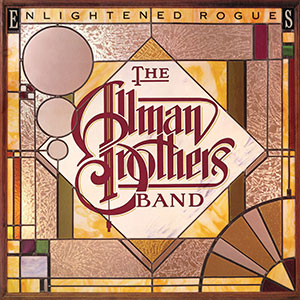
Enlightened Rogues is the sixth studio album by American rock band the Allman Brothers Band. Produced by Tom Dowd, the album was released in February 1979 in the United States by Capricorn Records and PolyGram Records elsewhere. The Allman Brothers Band had broken up in 1976 following internal turmoil, amplified by escalating drug use. The band members splintered into different acts — among those Great Southern, Sea Level, and the Gregg Allman Band. Guitarist Dickey Betts approached his bandmates in 1978 with the prospects of a reunion. It is the first to feature guitarist Dan Toler and bassist David Goldflies. Living together in Sarasota, Florida, they rehearsed and wrote the material for their next album in fall 1978.
"In Memory of Elizabeth Reed" is an instrumental composition by the American group The Allman Brothers Band. It first appeared on their second studio album, Idlewild South (1970), released on Capricorn Records. The jazz-influenced piece was written by guitarist Dickey Betts, among his first writing credits for the group. Betts named it after a headstone he saw for Elizabeth Jones Reed Napier in Rose Hill Cemetery in the band's hometown of Macon, Georgia. Multiple versions of the composition have been recorded, with the version performed on the group's 1971 live album At Fillmore East generally considered the definitive rendition.

The Allman Brothers Band was an American rock band formed in Jacksonville, Florida, in 1969 by brothers Duane Allman and Gregg Allman, as well as Dickey Betts, Berry Oakley, Butch Trucks (drums), and Jai Johanny "Jaimoe" Johanson (drums). The band incorporated elements of Southern rock, blues, jazz, and country music, and their live shows featured jam band-style improvisation and instrumentals.
"Whipping Post" is a song by The Allman Brothers Band. Written by Gregg Allman, the five-minute studio version first appeared on their 1969 debut album The Allman Brothers Band. The song was regularly played live and was the basis for much longer and more intense performances. This was captured in the Allman Brothers' 1971 double live album At Fillmore East, where a 22-minute, 40-second rendition of the song takes up the entire final side. It was this recording that garnered "Whipping Post" spots on both the Rock and Roll Hall of Fame's 500 Songs that Shaped Rock and Roll list and Rolling Stone's list of "The 500 Greatest Songs of All Time", which wrote, "the song is best appreciated in the twenty-three-minute incarnation on At Fillmore East."
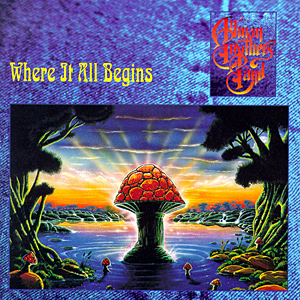
Where It All Begins is the eleventh studio album by the Allman Brothers Band. "No One to Run With" obtained the most album-oriented rock airplay, while "Soulshine", written by Warren Haynes, gained success as a concert and fan favorite. Gregg Allman also started to confront his substance abuse problems in the past on songs such as "All Night Train". The album sold considerably better than its predecessor, Shades of Two Worlds. In 1998, the album went Gold. Nevertheless, critical reception was weaker. This was also the last studio album the group recorded with original guitarist Dickey Betts.
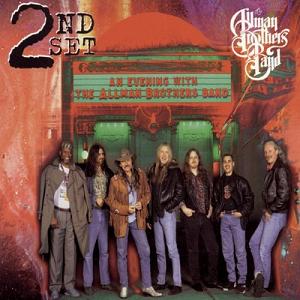
An Evening with the Allman Brothers Band: 2nd Set is a live album by the American rock group the Allman Brothers Band. It was recorded in 1992 and 1994, and released in 1995. The recording of "In Memory of Elizabeth Reed" was nominated for a Grammy Award for Best Pop Instrumental Performance at the 38th Annual Grammy Awards, but it lost to "Mariachi Suite" by Los Lobos. The recording of "Jessica" included on the album won a Grammy Award for Best Rock Instrumental Performance at the 38th Annual Grammy Awards in 1996.

Tommy Talton was an American guitarist who was a member of the rock groups Cowboy and We the People. He was also noted for playing and recording with Gregg Allman, Paul Butterfield, the Allman Brothers Band, Bonnie Bramlett, Clarence Carter, Corky Laing, Billy Joe Shaver, Dickey Betts, Kitty Wells, Martin Mull and Johnny Rivers.
Betts, Hall, Leavell and Trucks, often referred to as BHLT, was an American musical group that existed from 1982 to 1984 and that featured former members of The Allman Brothers Band and Wet Willie. Despite a positive reception for their live performances, the group never got a recording contract.
References
- 1 2 Reason, Betsy (July 14, 1994). "The Allman Brothers live!". The Noblesville Ledger. p. A5 – via Newspapers.com.
- 1 2 Leavell, Chuck; Craig, J. Marshall (2004). Between Rock And A Home Place. Dry Branch, Georgia: Evergreen Arts. pp. 261–262. ISBN 0-86554-975-3.
- ↑ The Allman Brothers Band, "No One to Run With" chart positions, Musicvf.com, Retrieved May 8, 2013
- ↑ The Allman Brothers Band, Where It All Begins, Discogs.com, Retrieved May 8, 2013
- ↑ Eder, Bruce. "Allman Brothers Band: 'Where It All Begins' – Review". AllMusic . Retrieved October 20, 2017.